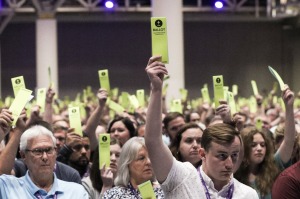My family’s 8-year infertility journey has forever changed Lent for me

On Oct. 9, 2020, my wife Hope started screaming. I thought she’d found a snake in the house.
As it turns out, she was pregnant.
We’d been married for 10 years at that point, struggling against infertility for over eight of those years, and told by doctors we’d be unable to conceive outside of IVF. We’d brought home the second of our two amazing adopted sons a mere week beforehand. In fact, I was feeding him when she explained the screams — and showed me the positive pregnancy test.
We had longed for and awaited that positive pregnancy test for so long that we felt we’d never see it. We began our married life both wanting a big family, only to be devastated by the realization we might never conceive.
But thanks to God, we were able to walk through that devastation into greater devotion. We were blessed with two beautiful adopted sons. My wife, Hope, also had the opportunity to return to school and then serve pediatric cancer patients for more than five years. We knew better than ever how much God loves us and how good He is.
For that reason, my experience of the Lenten season will never be the same. God was faithful and close to us during all those long, difficult years, and He was faithful and close to us in the moments of joy and in the gift of life.
Our longing for a child didn’t become despair, no matter how long we waited or how hard we tried, because we felt His presence every day. Our hope in Him would have been justified, even if we’d never conceived a biological child.
This is what hope looks like. It doesn’t often look like happiness. It rarely looks rational. Most of the time, in fact, hope is needed because you are suffering — and suffering from something that doesn’t make sense or seem fixable.
But the promise of Easter is among the central promises of the Christian faith: God is with us. God is risen. God has conquered death, sin, and suffering. He has ransomed us because He loves us.
God is our final and greatest hope. And each day we await the fulfillment of His promises, we have a chance to choose to hope in Him. But longing and waiting for Him is difficult, in part because we can’t possibly know what His plans for us hold — or when, or if, our present suffering may end.
“For I consider that the sufferings of this present time are not worth comparing with the glory that is to be revealed to us,” we read in Romans. “For the creation waits with eager longing for the revealing of the sons of God … For we know that the whole creation has been groaning together in the pains of childbirth until now. And not only the creation, but we ourselves, who have the firstfruits of the Spirit, groan inwardly as we wait eagerly for adoption as sons, the redemption of our bodies.”
During this season of Lent — as in our own personal struggles and even our lives as Christians journeying through a broken world — we wait with “eager longing.”
We suffer, yet we wait and hope. We know that we are promised to share in God’s restoration and, one day, experience our own. We know that God is with us, always. And it is “in this hope we are saved.”
This hope, importantly, surpasses the limits of our own lives. Even when God does not restore, reward or relieve us in this life, we can rest in our ultimate hope as we wait and long for total, eternal reconciliation and restoration with Him in Heaven.
“If God is for us,” after all, “who can be against us?”
Stephen Moore serves as the Director of WinShape Camps for Communities.




























